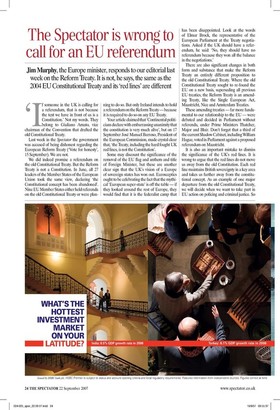The Spectator is wrong to call for an EU referendum
Jim Murphy, the Europe minister, responds to our editorial last week on the Reform Treaty. It is not, he says, the same as the 2004 EU Constitutional Treaty and its 'red lines' are different 1 6 f someone in the UK is calling for a referendum, that is not because the text we have in front of us is a Constitution.' Not my words. They belong to Giuliano Amato, vice chairman of the Convention that drafted the old Constitutional Treaty.
Last week in the Spectator the government was accused of being dishonest regarding the European Reform Treaty (Vote for honesty', 15 September). We are not.
We did indeed promise a referendum on the old Constitutional Treaty. But the Reform Treaty is not a Constitution. In June, all 27 leaders of the Member States of the European Union took the same view, declaring `the Constitutional concept has been abandoned'. Nine EU Member States either held referenda on the old Constitutional Treaty or were planning to do so. But only Ireland intends to hold a referendum on the Reform Treaty— because it is required to do so on any EU Treaty.
Your article claimed that 'Continental politicians declare with embarrassing unanimity that the constitution is very much alive', but on 17 September Jose Manuel Ban-oso, President of the European Commission, made crystal clear that, `the Treaty, including the hard fought UK red lines, is not the Constitution'.
Some may discount the significance of the removal of the EU flag and anthem and title of Foreign Minister, but these are another clear sign that the UK's vision of a Europe of sovereign states has won out. Eurosceptics ought to be celebrating the fact that the mythical 'European super-state' is off the table — if they looked around the rest of Europe, they would find that it is the federalist camp that has been disappointed. Look at the words of Elmar Brock, the representative of the European Parliament at the Treaty negotiations. Asked if the UK should have a referendum, he said: 'No, they should have no referendum because they won all the balance in the negotiations.'
There are also significant changes in both form and substance that make the Reform Treaty an entirely different proposition to the old Constitutional Treaty. Where the old Constitutional Treaty sought to re-found the EU on a new basis, superseding all previous EU treaties, the Reform Treaty is an amending Treaty, like the Single European Act, Maastricht, Nice and Amsterdam Treaties.
These amending treaties — far more fundamental to our relationship to the EU — were debated and decided in Parliament without referenda, under Prime Ministers Thatcher, Major and Blair. Don't forget that a third of the current Shadow Cabinet, including William Hague, voted in Parliament against a proposed referendum on Maastricht.
It is also an important mistake to dismiss the significance of the UK's red lines. It is wrong to argue that the red lines do not move us away from the old Constitution. Each red line maintains British sovereignty in a key area and takes us further away from the constitutional concept. As an example of one major departure from the old Constitutional Treaty, we will decide when we want to take part in EU action on policing and criminal justice. So we can keep control of our borders on the one hand, while opting in to measures that require cross-border co-operation — like the fight against organised crime and terrorism. (It was thanks to the European Arrest Warrant that we ensured the rapid extradition of one of the 21 July bombing suspects.) Another difference between the Constitutional Treaty and the Reform Treaty is the inclusion, at British request, of a new political declaration setting out clearly and unambiguously that nothing in the new Treaty affects the existing powers of member states in foreign policy, or the British and French UN Security Council seats. Can you imagine the French being any more willing than us to put this at risk? And where the old Constitutional Treaty made social security a matter for majority voting, now the UK has an effective veto on the issue through a strengthened 'emergency brake'.
So what is the net effect of these red lines? Rather than summing it up myself, I prefer to let the President of the European Parliament, Hans-Gert Pottering, a conservative, explain: 'It is important to recognise that the situation in the UK is different to that in the other 26 member states ...The deal struck by Tony Blair in June means that — for better or worse — much of its substance will not apply in Britain.'
We are therefore satisfied that our red lines protect our sovereignty to an extent that the 2004 Constitutional Treaty did not, and that the Reform Treaty is sufficiently different to the old Constitutional Treaty that a referendum is not required.
If these questions are settled — the Reform Treaty is not a Constitution, that is why we are not having a referendum, and our red lines mean that some of the substance will not apply in the UK — what about the positives? How are UK citizens going to benefit from the UK-specific deal we have got?
For many years people have lamented the inability of the EU to put to one side institutional questions and get on with what really matters — jobs, climate change, crime and so on. The Reform Treaty helps make this a realistic prospect, answering questions that the EU should have concluded some time ago, for example, by cutting back the number of commissioners and ending the six-monthly musical chairs of the changing presidency.
The claim that 'more than 60 national vetoes will be lost' as a result of the Treaty is again wrong. First, the Treaty will introduce majority voting in 50 new areas, not 60. Of these, 13 will only apply to the UK if we decide to participate (for example three apply to the euro). Of the rest, some are mind-bogglingly dull (would any of your readers care to discuss with me the ending of transport subsidies in the state of Saxony due to German reunification?) while others reflect existing practice. The remainder are issues where the UK actively sought majority voting in order to promote our priorities. For example the change to majority voting will enable the EU to provide humanitarian aid faster and more effectively in response to crises.
Britain is prospering in the EU because we are fully engaged in its debates and activities. British ideas have played a leading role in the development of the EU — on enlargement, budget reform, foreign policy and economic dynamism. Britain's interests are at the centre of the debate not on the margins — and the new Treaty, with its sensible reforms, will help us stay there. We will increase our influence as the 'weight' of our vote in the European Council goes up from 8 per cent to over 12 per cent. And beyond these percentages it is by building alliances with our friends across Europe, on a whole host of issues, that we will continue to achieve our goals in Europe and beyond. It is time we put the institutional debate behind us and focused on what really matters: delivering for our citizens.
Who is right? The government or The Spectator? Post your comments on our website — www. spectatorco.uklcoffeehouse.


































































 Previous page
Previous page